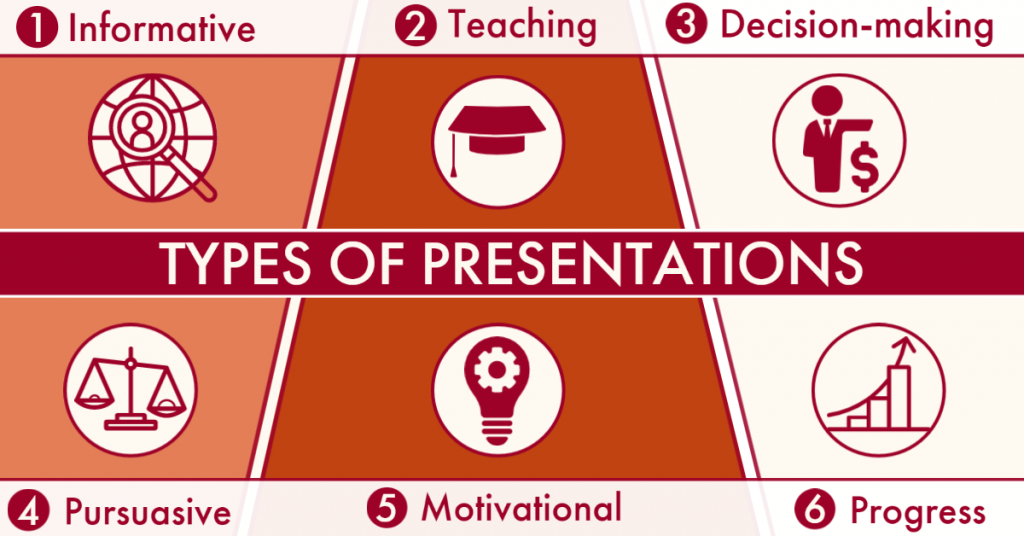The purpose of your presentation will decide the presentation type most suitable for accomplishing your goals. Read on for the six types and when to use them!

We have previously discussed WHY presentation skills are important in business.
(Haven’t read it? Click here to find out more!)
To summarise, a successful presentation relies on a person’s competency in several key skills, which include, but is not limited to, effective communication, stress management and adaptability.
However, like how ‘presentation skills’ incorporates multiple skills, there are also different types of presentation.
The presentation type depends on the subject matter, speaker’s goals and target audience.
The first step of preparation should involve determining what you wish to achieve with the presentation, which will help identify the most suitable presentation type.
1. Informative Presentation

In business, informative presentations are likely the most used presentations.
Informative presentations aim to provide instructions, present new findings or convey information to a knowledgeable audience. They are concise and a more engaging version of a written report.
Example: A marketing agency sharing and summarising trends and engagement over the past month and how they compare to previous months and competitors.
2. Teaching Presentation

Teaching presentations are similar to informative presentations.
They both share audiences, but teaching presentations actively increase the audience’s own understanding of a specific topic and go into far greater detail.
Example: A company are switching to new computer software, so provide onboarding materials and training sessions to ensure employees can execute new processes, which expedites the transition.
3. Decision-Making Presentation

Decision-making presentations address a problem, the possible solutions and their various outcomes.
The idea is to suitably inform the It’sence and guide them toward a decision on moving forward. It’s an interactive way to fast-track decision-making and discover innovative solutions.
Example: An Operations Manager has found multiple software options to improve workplace efficiency; however, each comes with a trade-off. They compile different options and request the team’s opinions before coming to a conclusion.
4. Persuasive Presentation

Are you selling a product or pitching a business idea to investors?
You’ll likely use a persuasive presentation to convince the audience that they should be interested in what you have to offer and how you can solve their problem using evidence, logic and engaging materials.
Example: An employee meets their manager to invest in better recycling initiatives. They share pollution data and how new recycling bins might help prevent recyclable materials from being thrown into general waste.
5. Motivational Presentation

This presentation style should inspire.
Think YouTube videos and TED Talks. The point is to capture the audience’s imagination and elicit change or a call to action. Those listening should feel connected to and inspired by the subject matter.
Example: A team leader outlining the goals that the business wants to achieve and the fundamental role that team will play as a collective and individual to accomplish these goals.
6. Progress Presentation

Again, this presentation is similar to informative because it shares information but focuses more on timelines.
The objective is to share with colleagues how a project is progressing, are the deadlines being met, the status updates, or if there have been any obstacles or new avenues that should be explored.
Example: A freelance software developer is creating a new website for a company. They set up a meeting with the stakeholders to discuss a recent problem they’ve encountered, the cost it will incur, how they intend to mitigate it and the impact on the project’s timeline.
If you are interested in developing your presentation skills further, follow the link to learn more about our hands-on, comprehensive Effective Presentations Skills Course led by one of our certified instructors.
We would love to learn more about your training requirements, so please get in touch with us today at 0115 958 6699 or email us at info@inferotraining.com for more information and a free, no-obligation consultation.





